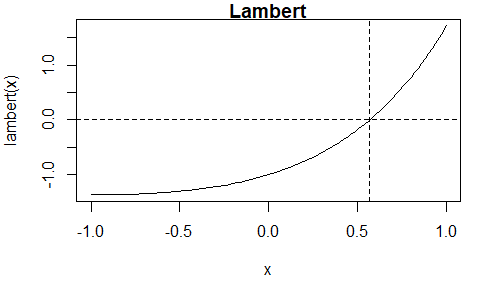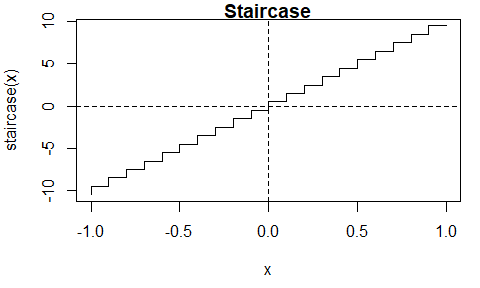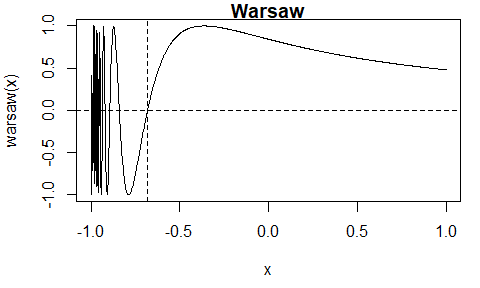The Interpolate, Truncate, Project (ITP) Root-Finding Algorithm.
itp
The Interpolate, Truncate, Project (ITP) Root-Finding Algorithm
The itp package implements the Interpolate, Truncate, Project (ITP) root-finding algorithm of Oliveira and Takahashi (2021). Each iteration of the algorithm results in a bracketing interval for the root that is narrower than the previous interval. It’s performance compares favourably with existing methods on both well-behaved functions and ill-behaved functions while retaining the worst-case reliability of the bisection method. For details see the authors’ Kudos summary and the Wikipedia article ITP method.
Examples
We use three examples from Section 3 of Oliveira and Takahashi (2021) to illustrate the use of the itp function. Each of these functions has a root in the interval $(-1, 1)$. The function can be supplied either as an R function or as an external pointer to a C++ function.
library(itp)
A continuous function
The Lambert function $l(x) = xe^x - 1$ is continuous.

The itp function finds an estimate of the root, that is, $x^$ for which $f(x^)$ is (approximately) equal to 0. The algorithm continues until the length of the interval that brackets the root is smaller than $2 \epsilon$, where $\epsilon$ is a user-supplied tolerance. The default is $\epsilon = 10^{-10}$.
First, we supply an R function that evaluates the Lambert function.
# Lambert, using an R function
lambert <- function(x) x * exp(x) - 1
itp(lambert, c(-1, 1))
#> function: lambert
#> root f(root) iterations
#> 0.5671 2.048e-12 8
Now, we create an external pointer to a C++ function that has been provided in the itp package and pass this pointer to the function itp(). For more information see the Overview of the itp package vignette.
# Lambert, using an external pointer to a C++ function
lambert_ptr <- xptr_create("lambert")
itp(lambert_ptr, c(-1, 1))
#> function: lambert_ptr
#> root f(root) iterations
#> 0.5671 2.048e-12 8
The function itp_c
Also provided is the function itp_c, which is equivalent to itp, but the calculations are performed entirely using C++, and the arguments differ slightly: itp_c has a named required argument pars rather than ... and it does not have the arguments interval, f.a or f.b.
# Calling itp_c()
res <- itp_c(lambert_ptr, pars = list(), a = -1, b = 1)
res
#> function:
#> root f(root) iterations
#> 0.5671 2.048e-12 8
A discontinuous function
The staircase function $s(x) = \lceil 10 x - 1 \rceil + 1/2$ is discontinuous.

The itp function finds the discontinuity at $x = 0$ at which the sign of the function changes. The value of 0.5 returned for the root res$root is the midpoint of the bracketing interval [res$a, res$b] at convergence.
# Staircase
staircase <- function(x) ceiling(10 * x - 1) + 1 / 2
res <- itp(staircase, c(-1, 1))
print(res, all = TRUE)
#> function: staircase
#> root f(root) iterations a b f.a
#> 7.404e-11 0.5 31 0 1.481e-10 -0.5
#> f.b precision
#> 0.5 7.404e-11
A function with multiple roots
The Warsaw function $w(x) = I(x > -1)\left(1 + \sin\left(\frac{1}{1+x}\right)\right)-1$ has multiple roots.

When the initial interval is $[-1, 1]$ the itp function finds the root $x \approx -0.6817$. There are other roots that could be found from a different initial interval.
# Warsaw
warsaw <- function(x) ifelse(x > -1, sin(1 / (x + 1)), -1)
itp(warsaw, c(-1, 1))
#> function: warsaw
#> root f(root) iterations
#> -0.6817 -5.472e-11 11
Installation
To get the current released version from CRAN:
install.packages("itp")
Vignette
See the Overview of the itp package vignette, which can also be accessed using vignette("itp-vignette", package = "itp").